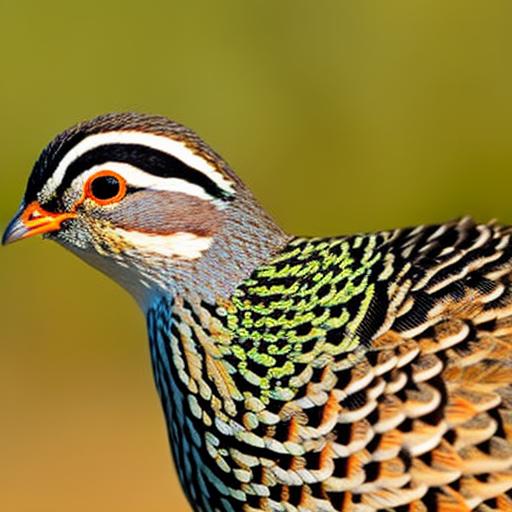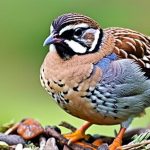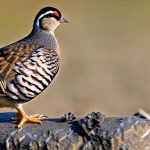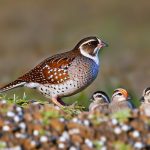When it comes to choosing the right quail species for your quail farming venture, there are several factors to consider. The most common quail species for farming are the Coturnix quail, also known as Japanese quail, and the Bobwhite quail. Coturnix quail are known for their high egg production and fast growth rate, making them a popular choice for commercial quail farming. On the other hand, Bobwhite quail are known for their delicious meat and are often raised for hunting purposes.
Coturnix quail come in a variety of colors, including brown, white, and tuxedo, while Bobwhite quail are typically found in the wild with a mottled brown and white plumage. When choosing a quail species, it’s important to consider your specific goals for your quail farm. If you’re looking to produce a large number of eggs for sale, Coturnix quail may be the best choice for you. However, if you’re interested in raising quail for meat production or hunting purposes, Bobwhite quail may be the better option. Additionally, consider the climate and environment in which you will be raising your quail, as different species may have different requirements for temperature and housing.
When selecting a quail species, it’s important to consider the availability of chicks or eggs for hatching. Coturnix quail are readily available from hatcheries and are often sold as day-old chicks or hatching eggs. Bobwhite quail may be more challenging to find, as they are not as commonly raised in captivity. Consider the availability of resources such as feed and housing materials for your chosen quail species, as well as any specific regulations or restrictions that may apply to the species in your area. By carefully considering these factors, you can choose the right quail species for your farming venture and set yourself up for success.
Key Takeaways
- Choose the quail species that best suits your needs and environment, such as Coturnix or Bobwhite.
- Create a living environment that includes proper bedding, temperature control, and adequate space for the quail to thrive.
- Provide a balanced diet with high-quality feed and access to fresh water to ensure proper nutrition for the quail.
- Monitor the health of the quail regularly and provide necessary vaccinations and treatments to prevent diseases.
- Understand the breeding and reproduction process of quail, including incubation and brooding, to successfully expand your quail population.
- Handle quail with care and provide socialization to reduce stress and ensure their well-being.
- Familiarize yourself with legal considerations and regulations regarding quail ownership and breeding in your area to avoid any legal issues.
Creating the Ideal Living Environment
Creating the ideal living environment for your quail is essential for their health and well-being. Quail require a clean and spacious living area that provides them with protection from predators and the elements. When it comes to housing, there are several options to consider, including cages, aviaries, or free-range systems. Cages are a popular choice for commercial quail farming, as they allow for easy management and cleaning. Aviaries provide a more natural environment for quail and allow them to fly and move around more freely. Free-range systems allow quail to roam and forage for food, but may require more space and protection from predators.
Regardless of the housing system you choose, it’s important to provide your quail with a comfortable and safe environment. This includes providing adequate ventilation, lighting, and temperature control. Quail are sensitive to extreme temperatures, so it’s important to provide heating or cooling as needed to keep them comfortable. Additionally, providing nesting boxes or areas for brooding is essential for breeding and reproduction.
In addition to housing, it’s important to provide your quail with a suitable outdoor space for exercise and foraging. This can be achieved by providing a secure outdoor pen or allowing them access to a larger outdoor area. Providing natural elements such as grass, dirt, and plants can help keep your quail entertained and stimulated. By creating the ideal living environment for your quail, you can ensure that they thrive and remain healthy.
Feeding and Nutrition
Feeding and nutrition are crucial aspects of quail farming that directly impact the health and productivity of your birds. Quail require a balanced diet that provides them with the necessary nutrients for growth, egg production, and overall health. A high-quality commercial quail feed is an excellent option for providing the essential nutrients that quail need. These feeds are specially formulated to meet the nutritional requirements of quail at different stages of life, such as starter feeds for chicks and layer feeds for mature birds.
In addition to commercial feeds, quail can also benefit from supplemental foods such as fresh fruits and vegetables, grains, and protein sources like mealworms or crickets. These treats can provide additional nutrients and help keep your quail engaged and stimulated. It’s important to provide access to clean water at all times, as quail require water for digestion and overall health.
When it comes to feeding your quail, it’s important to monitor their intake and adjust their diet as needed. Overfeeding can lead to obesity and health issues, while underfeeding can result in poor growth and egg production. It’s important to provide the appropriate amount of feed based on the age and activity level of your quail. Additionally, it’s important to monitor the condition of your birds to ensure they are maintaining a healthy weight and appearance.
By providing a balanced diet and monitoring their intake, you can ensure that your quail receive the nutrition they need to thrive. Proper feeding and nutrition are essential for the health and productivity of your quail flock.
Health and Wellness
Maintaining the health and wellness of your quail is essential for their overall well-being and productivity. There are several key aspects to consider when it comes to keeping your quail healthy. Regular health checks are important for monitoring the condition of your birds and identifying any potential issues early on. This includes observing their behavior, appearance, and egg production.
Preventative measures such as vaccination and parasite control are important for keeping your quail healthy. Consult with a veterinarian or experienced quail farmer to determine the appropriate vaccination schedule for your birds based on their age and environment. Additionally, regular deworming and parasite control can help prevent common health issues in quail.
Maintaining a clean living environment is essential for preventing disease and promoting good health in your quail flock. Regular cleaning of cages or aviaries, as well as providing clean bedding and nesting materials, can help prevent the spread of bacteria and parasites. It’s also important to provide proper ventilation and temperature control to prevent respiratory issues in your birds.
In addition to preventative measures, it’s important to be prepared to address any health issues that may arise in your quail flock. This includes having a basic understanding of common health issues in quail, as well as access to veterinary care when needed. By prioritizing the health and wellness of your quail, you can ensure that they remain productive and thrive in your care.
Breeding and Reproduction
Breeding and reproduction are important aspects of quail farming that require careful planning and management. When it comes to breeding quail, it’s important to consider factors such as genetics, age, and environmental conditions. Selecting high-quality breeding stock is essential for producing healthy and productive offspring. Look for birds that exhibit desirable traits such as good egg production, strong growth rate, and overall health.
Quail reach sexual maturity at around 6-8 weeks of age, at which point they can begin breeding. It’s important to provide a suitable environment for breeding, including nesting boxes or areas where hens can lay their eggs undisturbed. Additionally, providing a balanced diet with adequate nutrition is essential for successful breeding and reproduction.
Once eggs are laid, it’s important to provide proper incubation conditions to ensure a high hatch rate. This includes maintaining consistent temperature and humidity levels throughout the incubation period. After hatching, it’s important to provide proper care and nutrition for the chicks to ensure their healthy growth and development.
Managing breeding and reproduction in your quail flock requires careful observation and record-keeping. Keep track of breeding pairs, egg production, hatch rates, and chick growth to monitor the success of your breeding program. By carefully managing breeding and reproduction in your quail flock, you can ensure a steady supply of eggs or meat for your farm.
Handling and Socialization

Handling and socialization are important aspects of raising healthy and well-adjusted quail. Proper handling from a young age can help quail become more comfortable with human interaction, making them easier to manage as adults. When handling young chicks, it’s important to be gentle and calm to avoid causing unnecessary stress.
Socialization is also important for promoting positive behavior in your quail flock. Providing opportunities for social interaction within the flock can help reduce aggression and promote a harmonious environment. This can be achieved by providing ample space for birds to move around freely, as well as providing enrichment activities such as perches or toys.
It’s important to approach handling and socialization with patience and consistency. Spend time with your birds regularly to help them become accustomed to human presence. Avoid sudden movements or loud noises that may startle or stress your birds. By taking the time to handle and socialize your quail from a young age, you can help them become more comfortable with human interaction and promote positive behavior within the flock.
Legal Considerations and Regulations
When starting a quail farming venture, it’s important to be aware of any legal considerations and regulations that may apply to your area. This includes obtaining any necessary permits or licenses required for raising quail commercially. Contact your local agricultural department or extension office to inquire about any specific regulations or requirements that may apply to quail farming in your area.
In addition to permits or licenses, it’s important to be aware of any zoning restrictions that may apply to raising quail on your property. Some areas may have specific zoning regulations related to agricultural activities or animal husbandry that could impact your ability to raise quail on your land.
It’s also important to be aware of any animal welfare regulations that may apply to raising quail. This includes providing adequate housing, nutrition, and veterinary care for your birds. Familiarize yourself with any specific guidelines or standards related to animal welfare in poultry farming.
By staying informed about legal considerations and regulations related to quail farming, you can ensure that you are operating within the law and promoting the well-being of your birds. Taking the time to research and understand any legal requirements will help you establish a successful and compliant quail farming operation.
In conclusion, choosing the right quail species is crucial for setting up a successful farming venture. Creating an ideal living environment involves providing suitable housing with proper ventilation, lighting, temperature control, outdoor space for exercise, natural elements like grass or plants, nesting boxes or areas for brooding is essential for breeding & reproduction; feeding & nutrition involves providing high-quality commercial feed & supplemental foods like fresh fruits & vegetables; health & wellness requires regular health checks & preventative measures like vaccination & parasite control; breeding & reproduction involves selecting high-quality breeding stock & providing suitable environment; handling & socialization involves proper handling from a young age & social interaction within the flock; legal considerations & regulations involve obtaining necessary permits or licenses & being aware of zoning restrictions & animal welfare regulations that may apply in your area.
In conclusion, choosing the right quail species is crucial for setting up a successful farming venture. Creating an ideal living environment involves providing suitable housing with proper ventilation, lighting, temperature control, outdoor space for exercise, natural elements like grass or plants, nesting boxes or areas for brooding is essential for breeding & reproduction; feeding & nutrition involves providing high-quality commercial feed & supplemental foods like fresh fruits & vegetables; health & wellness requires regular health checks & preventative measures like vaccination & parasite control; breeding & reproduction involves selecting high-quality breeding stock & providing a suitable environment; handling & socialization involves proper handling from a young age & social interaction within the flock; legal considerations & regulations involve obtaining necessary permits or licenses & being aware of zoning restrictions & animal welfare regulations that may apply in your area. It is important to carefully consider each of these factors in order to ensure the success and sustainability of a quail farming operation.
If you’re interested in keeping quails at home, you might also want to explore the benefits of turning a shed into a chicken coop. This related article from PoultryWizard provides valuable insights into creating a suitable living space for chickens, which can also be adapted for quails. Check out the article here to learn more about maximizing space and creating a comfortable environment for your feathered friends.
FAQs
What are quails?
Quails are small ground-dwelling birds that are often kept for their eggs and meat. They are known for their distinctive calls and are found in various parts of the world.
What do quails eat?
Quails are omnivores and their diet consists of a variety of foods including seeds, insects, and small plants. In captivity, they can be fed a commercial quail feed as well as fresh greens and insects.
How much space do quails need?
Quails require a minimum of 1 square foot of space per bird in their living area. It’s important to provide enough space for them to move around and exhibit natural behaviors.
What kind of housing do quails need?
Quails need a secure and well-ventilated housing that protects them from predators and the elements. This can be a coop or a cage with a solid floor and a roof.
How do you keep quails warm in the winter?
Quails are generally hardy birds, but they may need additional heat in the winter months. This can be provided through heat lamps or heated pads, ensuring that the temperature does not drop below freezing.
How do you keep quails cool in the summer?
In hot weather, it’s important to provide shade and good ventilation for quails. Additionally, frozen water bottles or misting systems can help keep them cool.
Do quails need companionship?
Quails are social birds and it’s recommended to keep them in groups of at least 3-4 birds. They thrive in the company of their own kind and can become stressed if kept alone.
What are the benefits of keeping quails at home?
Keeping quails at home can provide a sustainable source of eggs and meat. They are relatively low maintenance and can be a great addition to a small-scale homestead or urban backyard.
Meet Walter, the feathered-friend fanatic of Florida! Nestled in the sunshine state, Walter struts through life with his feathered companions, clucking his way to happiness. With a coop that’s fancier than a five-star hotel, he’s the Don Juan of the chicken world. When he’s not teaching his hens to do the cha-cha, you’ll find him in a heated debate with his prized rooster, Sir Clucks-a-Lot. Walter’s poultry passion is no yolk; he’s the sunny-side-up guy you never knew you needed in your flock of friends!







